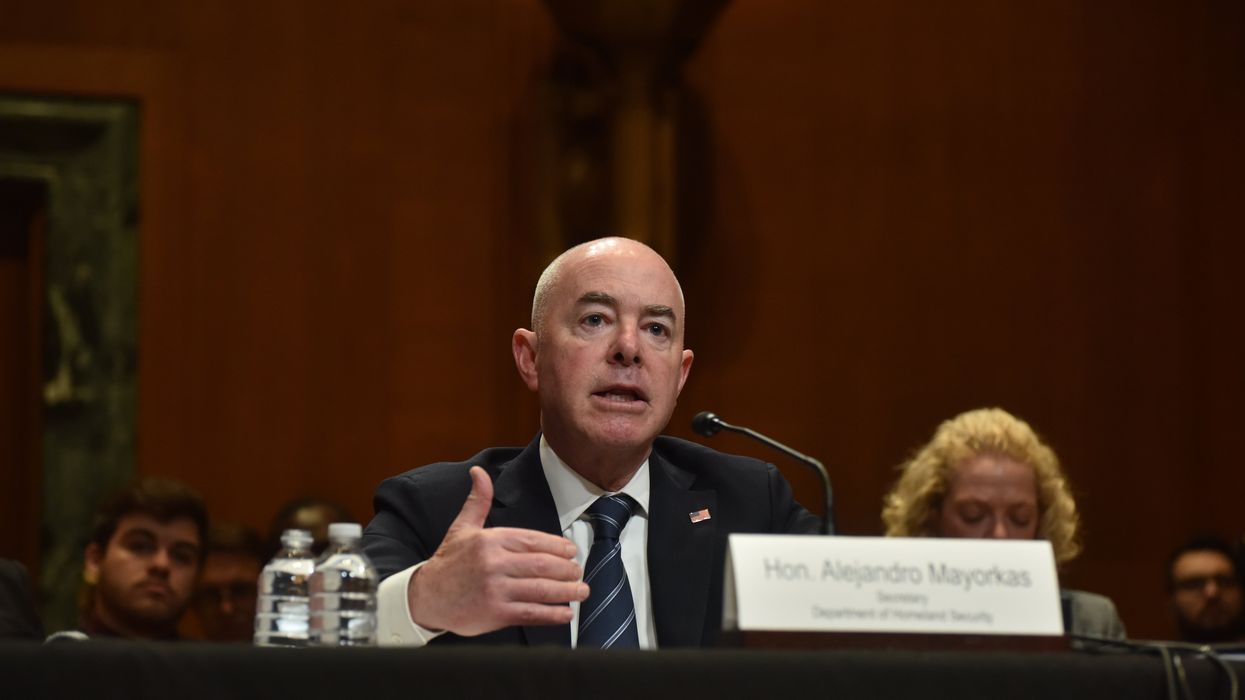Ambartsoumian-Clough is the executive director of United Stateless.
It's worrying when a government agency appears to go its own way over the stated commitments of the person in charge of overseeing it. Right now, Immigration and Customs Enforcement needs to do more to comply with the commitments of its leader, Homeland Security Security Alejandro Mayorkas, to help stateless people in America.
Sergei Kachenkov’s story illustrates why. He’s a member of United Stateless, a nonprofit organization founded by stateless people and where I’m the executive director. All our members have our own stories, but all stateless people are stuck in a legal limbo. We don't have passports from the countries of our birth, often because those countries disavow us for political, discriminatory or a host of other reasons, and many of us lack papers here in the United States. Sergei came to the United States fleeing the former Soviet Union in 1991. His Soviet passport is invalid because his country no longer exists. Now he lives in Alabama and is over 70. Retired, he is now a full-time career for his wife, Marina, who is disabled, suffering from a rare blood disorder, and stateless too. She worked for years managing retail stores.
Without laws to address statelessness, the couple were forced to seek other remedies for their situation, and so they applied for asylum. Their claim was denied years ago, and so they still face a final removal order by Immigration and Customs Enforcement. Because ICE won't lift that order, and has not adopted a policy about statelessness, Sergei and Marina can’t get protection under new protections for stateless people, introduced last year.
Their predicament is a lot more than theoretical. It’s real and paralyzing. Yet it is the result of an unusual situation where one agency under Mayorkas (ICE) hasn’t kept up with the direction taken by another (U.S. Citizenship and Immigration Services) or with Mayorkas’ stated desire to help stateless people.
In December 2021, Mayorkas said the Department of Homeland Security would "enhance protections" for stateless people. And USCIS has since done much to honor that. In August 2023, USCIS amended its policy manual to define statelessness. It now addresses the legal needs of stateless people by allowing USCIS officers to consider statelessness as a positive factor in decisions. USCIS also considered statelessness in processes for H-1B employment visas. And the agency has adopted policies that can assist stateless students. We've also engaged with USCIS representatives, who have shown willingness to open dialogue.
ICE, however, has not kept up. That agency has not adopted its own policy on statelessness, and Sergei’s and Marina’s legal statuses are under ICE’s authority, so they can't get protection under the new USCIS definition of statelessness. If ICE had a similar policy to the new USCIS definition, it could lift Sergei and Marina’s final removal order, allowing people like them access to protections.
Despite having no criminal record whatsoever and despite paying taxes for more than 30 years, Sergei and Marina have also faced barriers accessing Social Security benefits. At one point, the elderly couple’s benefits were cut off for two years and Marina had to turn to charity to cover her medical treatment. Sergei worries that his Social Security benefits will be cut off again and that he’ll have to forage for food. He even said, “What am I going to do? Eat snakes from the woods behind our house?” When Sergei tried to explain to an officer about their predicament, he claims, the officer was rude. Sergei says the officer told the couple, "I don't care where you go, walk to Mexico, walk to Canada, just get out of this country."
Those aren't the words of a humane officer of the United States government. They sound a lot more like a soldier in the government of the country Sergei and Marina fled. I wish that Sergei's story was unique, but other United Stateless members have faced similar mistreatment.
Sergei and Marina’s story is illustrative of situations facing many stateless people in the U.S. For all of us, being stateless makes living, working, and getting health care or an education very challenging. Even if the government tries to deport us, there is no country that will accept us. Many of us find ourselves in ICE detention as a result. In the end we are often released because there is nowhere for us to go, leaving some of us to live under deportation orders and under supervision for up to 30 years.
In February, Washington Post columnist Theresa Vargas wrote about one of our stateless community members. Henry Pachnowski is a stateless Holocaust survivor who couldn't access Social Security benefits. His story shows anyone can get caught up in being stateless. Numbering around 200,000, we are Harvard graduates and military veterans. We run businesses. We contribute taxes to Social Security. And yet many of us are still living in fear of a knock on the door from ICE. That's despite efforts by Mayorkas to assist.
It is time for ICE to get in line with its leadership, its sister agency and the international community. ICE must adopt the international definition of statelessness and ensure that legal protections are available to stateless people to avoid legal limbo and indefinite detention. And it can do more. It can also collect data on stateless people applying for immigration relief.
What I fail to understand is why ICE seems resistant to following Mayorkas’s commitments. What’s going on here?




















Trump & Hegseth gave Mark Kelly a huge 2028 gift